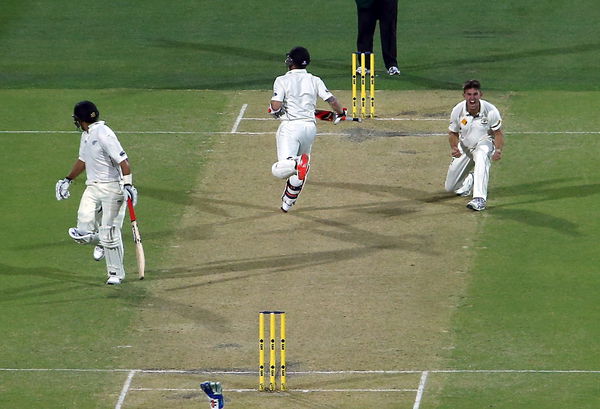
via Reuters
Australia’s Mitchell Marsh (R) celebrates after he dismissed New Zealand’s captain Brendon McCullum (C) LBW for 20 runs during the second day of the third cricket test match at the Adelaide Oval, in South Australia, November 28, 2015. REUTERS/David Gray

via Reuters
Australia’s Mitchell Marsh (R) celebrates after he dismissed New Zealand’s captain Brendon McCullum (C) LBW for 20 runs during the second day of the third cricket test match at the Adelaide Oval, in South Australia, November 28, 2015. REUTERS/David Gray
By Ian Ransom
ADELAIDE (Reuters) – The optimism sparked by bumper crowds at Adelaide Oval for the inaugural day-night test between Australia and New Zealand was tempered on Saturday by another bout of tumbling wickets.
After 12 wickets fell on the opening day’s play, another 13 piled up on day two as the time-honoured battle between bat and ball was decisively won by the bowlers on both sides.
ADVERTISEMENT
Article continues below this ad
New Zealand were 116-5 at stumps, clinging to a precarious 94-run lead after struggling to deal with the pink ball under the floodlights in the evening session.
A match seen as the future of test cricket faces the prospect of ending in three days, which would leave fans short-changed and organisers red-faced after a grassy pitch was prepared specially to slow the pink ball’s wear and tear.
“I think there is a bit more exploring that needs to be done,” New Zealand batsman Ross Taylor, who was dismissed lbw for 32 in the late session, told reporters.
“There’s been a few factors that have helped the ball stay in shape. It’s been a lush wicket and the outfield is quite long so the ball is not hitting the pickets as hard.
“If there is an abrasive wicket I don’t think it would stay as new and there would be different dynamics.
“But it’s here for this game and for the next little while, whatever the result is, people will have an opinion on it.”
Cricket Australia have championed day-night test cricket, sounding out the Pakistan Cricket Board (PCB) for a match next summer.
New Zealand’s board have also floated a match under lights against Bangladesh.
Broadcasters are naturally pushing for more of the same and the International Cricket Council sees floodlit tests as a way to save the game’s oldest format from terminal decline.
ADVERTISEMENT
Article continues below this ad
Convincing the players will take more work, however, and Australia’s players’ association still regards this test as a trial rather than a first instalment.
“It’s something that can be worked on,” Australia paceman Josh Hazlewood, who shone with 3-32 on Saturday, told reporters.
“I think it’s a success. The wicket’s not that bad to have so many wickets taken in two days.
ADVERTISEMENT
Article continues below this ad
“We had a middle-order collapse today. We should probably be still batting now.”
(Reporting by Ian Ransom; Editing by Rob Hodgetts)
ADVERTISEMENT
ADVERTISEMENT
ADVERTISEMENT
ADVERTISEMENT

